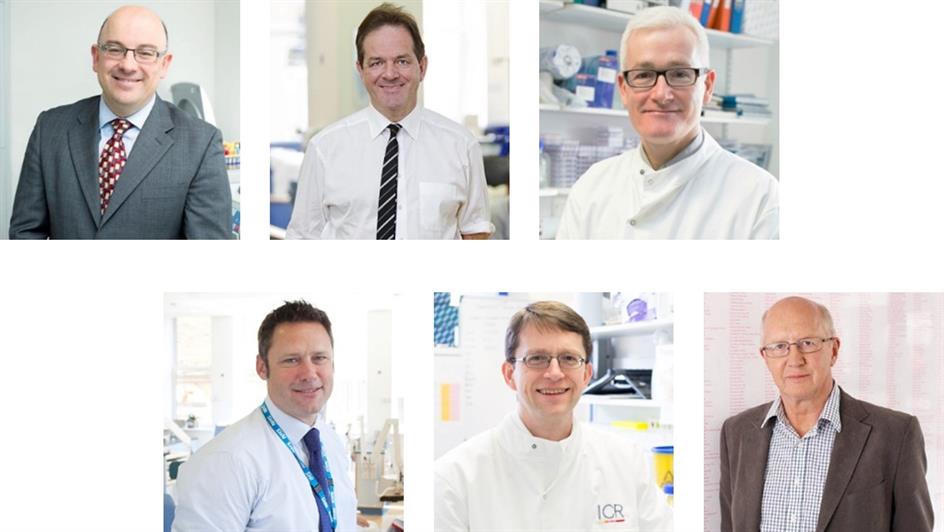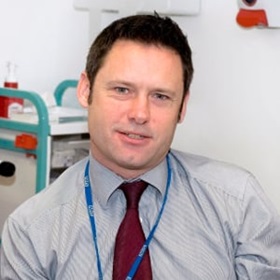
Six researchers at The Institute of Cancer Research and our partner hospital, The Royal Marsden NHS Foundation Trust, have been named in a list of the world's most influential and innovative researchers over the last decade.
Professors Johann de Bono, David Cunningham, Kevin Harrington, James Larkin and Nicholas Turner, and Emeritus Professor Mitch Dowsett feature in the latest Highly Cited Researchers list published by science analytics company Clarivate. The number of times an academic paper is cited in the papers published by other researchers' is a measure of recognition by peers their influence within their research field.
The list, which uses the number of highly-cited papers that rank in the top 1% by citations for field and year over the last decade, identifies those who are world leading.
Highly Cited Researchers
Professor de Bono is Regius Professor of Cancer Research and a Professor in Experimental Cancer Medicine at the ICR, where he is a prostate cancer expert and a leading figure in his field. He leads major international prostate cancer trials and a research programme underpinning them, as well as being head of the Drug Development Unit at the ICR and The Royal Marsden.
Professor David Cunningham, Director of Clinical Research at The Royal Marsden and Director of the NIHR Biomedical Research Centre at The Royal Marsden and the ICR, has conducted late phase clinical trials that have significantly improved the survival and outcome for patients, especially with gastrointestinal cancers.
Emeritus Professor Mitch Dowsett was Head of the joint Academic Department of Biochemistry at The Royal Marsden and the ICR, and studies the role of hormones in breast cancer. He has been a pioneer in the clinical development of aromatase inhibitors in breast cancer treatment.
Professor Kevin Harrington is a world-leading expert in the development of immunotherapy in cancer treatments, specialising in developing new treatments using biologically targeted agents like viruses, antibodies and small molecules that selectively destroy cancer cells. He is Professor of Biological Cancer Therapies at the ICR and a Consultant Oncologist at The Royal Marsden.
Professor James Larkin is a Consultant Medical Oncologist at The Royal Marsden and Professor in the Division of Clinical Studies at the ICR. He specialises in the treatment of melanoma and cancers of the kidney and is developing personalised treatments for patients with cancer and using new targeted treatments that boost the immune system's ability to fight cancer.
Professor Nicholas Turner leads the Molecular Oncology Team at the ICR and is a Consultant Medical Oncologist at The Royal Marsden, where he is also Head of the Ralph Lauren Centre for Breast Cancer Research. He is Chief Investigator of numerous clinical trials on personalised therapies for breast cancer.
High-quality research
Highly cited researchers are identified in the Clarivate list for their exceptional research performance, determined by the publication of multiple papers that rank in the top 1% by citations for their field over 10 years.
Professors Dowsett, Harrington and Turner were also listed in the 'Cross-Field' category, which recognises researchers who have been influential across several fields in the last 10 years.
Global impact of our research
The appearance of our researchers in the Highly Cited list is one of several recent indications of our world-leading impact, which have also included a strong performance in the UK Government's first Knowledge Exchange Framework, which assesses universities' partnerships and their influence on wider society, and a high ranking in this year's U-Multirank assessment.
Dr Barbara Pittam, Director of Academic Services at The Institute of Cancer Research, said:
"We're delighted to see so many of our researchers listed; to be included is a great achievement. It's an indication of both the quality of our research and the impact we have in influencing cancer research across the world and the researchers, their teams and all who support them should be congratulated."

 .
.